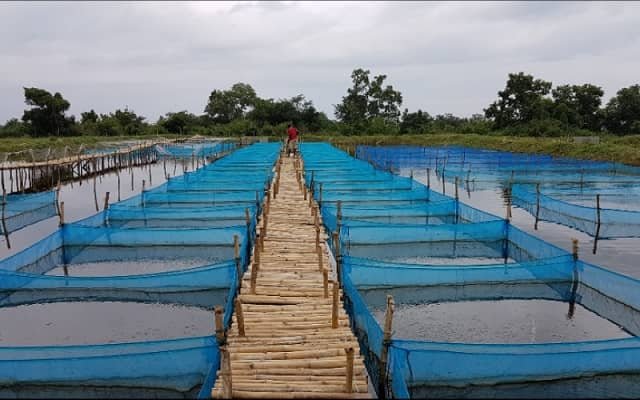New Zealand.- A small, bony, oily fish holds great hope for Solomon Islands communities, who are working with Wintec to enhance aquaculture productivity through education and an innovative phone app.
Wintec researchers are working with farmers in Malaita province in the Solomon Islands where tilapia fish are farmed in inland ponds. The aim is to develop better ways of farming and introduce tilapia farming as a training course using the existing farms as demonstration sites. Funding from the New Zealand Aid Programme (administered by the Ministry of Foreign Affairs and Trade – MFAT) has enabled this three-year partnership with Wintec and the Solomon Islands Association of Vocational and Rural Training Centres (SIAVRTC).
Wintec research team manager Dr Debbie Care is one of the team working with Solomon Islands farmers and says offshore fisheries are depleted, with a lack of protein in the local diet causing health issues.
“It’s subsistence living for many people in the Solomons, they grow it, catch it or go without,” says Debbie.
“Not many people can imagine the level of subsistence, but Solomon Islanders are rich in many ways. They don’t have a lot, but they are incredibly generous and very keen to develop their resources.”
Surrounded by sea, it would be too easy to imagine these people are in the midst of a viable food and business resource, but Debbie says large scale sea fishing means communities now have to sail further for their catch, requiring boats and equipment the people simply do not have. Developing aquaculture is one answer and the tilapia, an inland freshwater fish introduced in the 1950s as a food source, offers potential to develop aquaculture as a sustainable and profitable option for the people of the Solomon Islands.
“One of our challenges is online connectivity and communications,” Debbie says. This means that despite a high uptake of mobile technology there is limited internet coverage, and this inspired the Wintec team to develop an offline app with the community to support education.
“The app is instructional and looks at all aspects of fish farming including managing fish ponds, cooking and preserving fish and basic financial literacy,” says Debbie.
Stay Always Informed
Join our communities to instantly receive the most important news, reports, and analysis from the aquaculture industry.
“It’s an evolving project, our next steps are to take the App back to the Solomon Islands tilapia farmers this month to get feedback. Meanwhile we are looking for more farmers to test the app for ease of navigation and to develop a level of intuitiveness to map their thinking.”
The Wintec researchers are part of a team which includes Nick Borthwick from Wintec’s International Development Services, who worked closely with MFAT and SIAVRTC in finalising project designs and initiating activities on the ground.
After seven years of working with Solomon Islands’ communities, Nick says “Solomon Islanders have great resilience and ingenuity, which is constantly drawn upon to flourish through the numerous challenges posed by their environment. There is a real thirst for practical knowledge that can be quickly and easily accessed and applied to daily livelihoods. We’re using ICT to revolutionise access to knowledge which rural Solomon Islanders tell us they need.”
Looking ahead three years, Debbie says Wintec aims to impact at least 500 community members through the initiatives developed under the scheme.
“There will be value-added business opportunities, more protein in the diet and cashflow in the family home. The app will continue to be developed to include recipes, financial information, as well as better ways to farm tilapia through education.”
The three-year project is funded by the New Zealand Ministry of Foreign Affairs and Trade (MFAT) until 2020.
Source: WINTEC
Editor at the digital magazine AquaHoy. He holds a degree in Aquaculture Biology from the National University of Santa (UNS) and a Master’s degree in Science and Innovation Management from the Polytechnic University of Valencia, with postgraduate diplomas in Business Innovation and Innovation Management. He possesses extensive experience in the aquaculture and fisheries sector, having led the Fisheries Innovation Unit of the National Program for Innovation in Fisheries and Aquaculture (PNIPA). He has served as a senior consultant in technology watch, an innovation project formulator and advisor, and a lecturer at UNS. He is a member of the Peruvian College of Biologists and was recognized by the World Aquaculture Society (WAS) in 2016 for his contribution to aquaculture.







